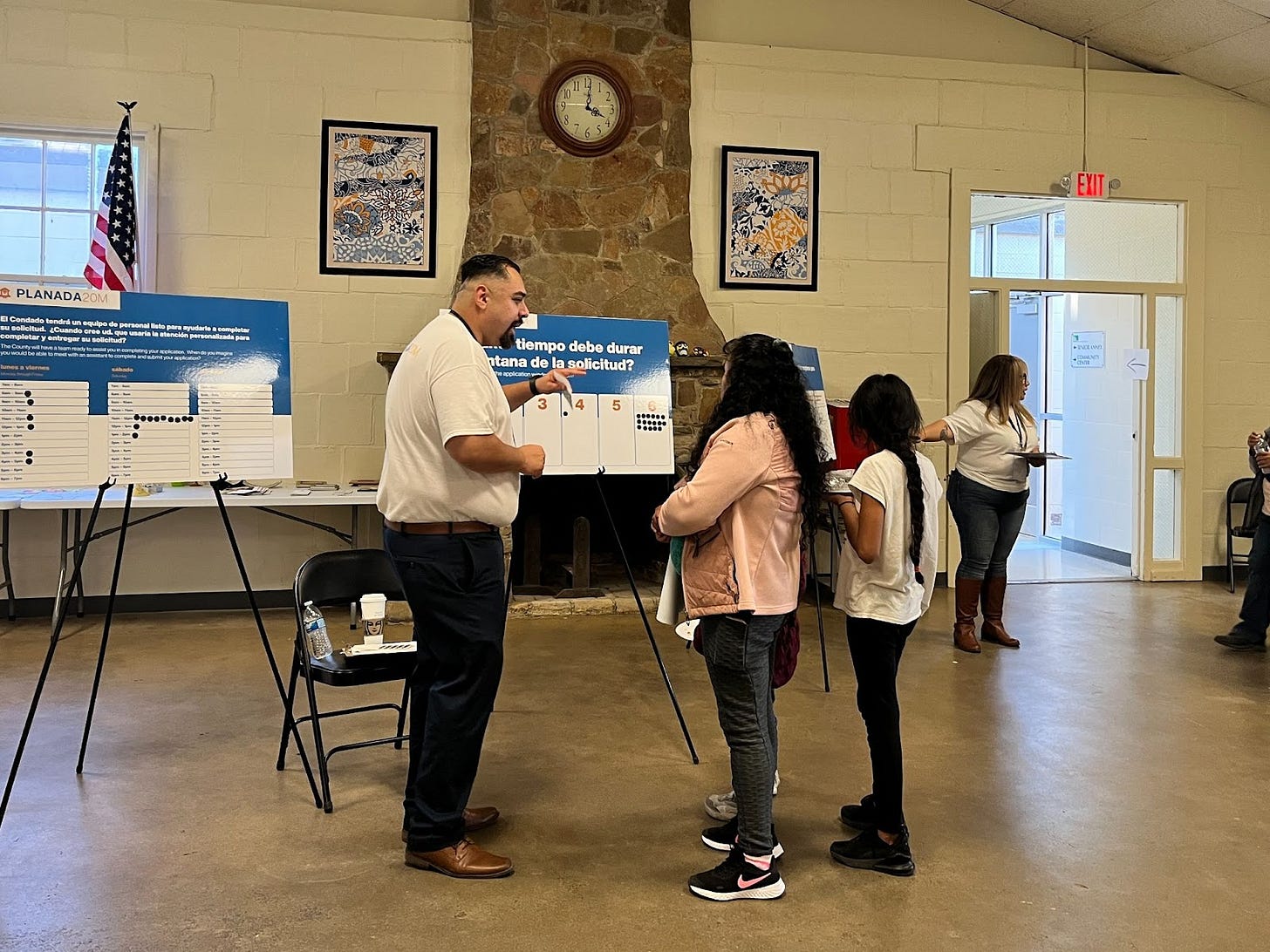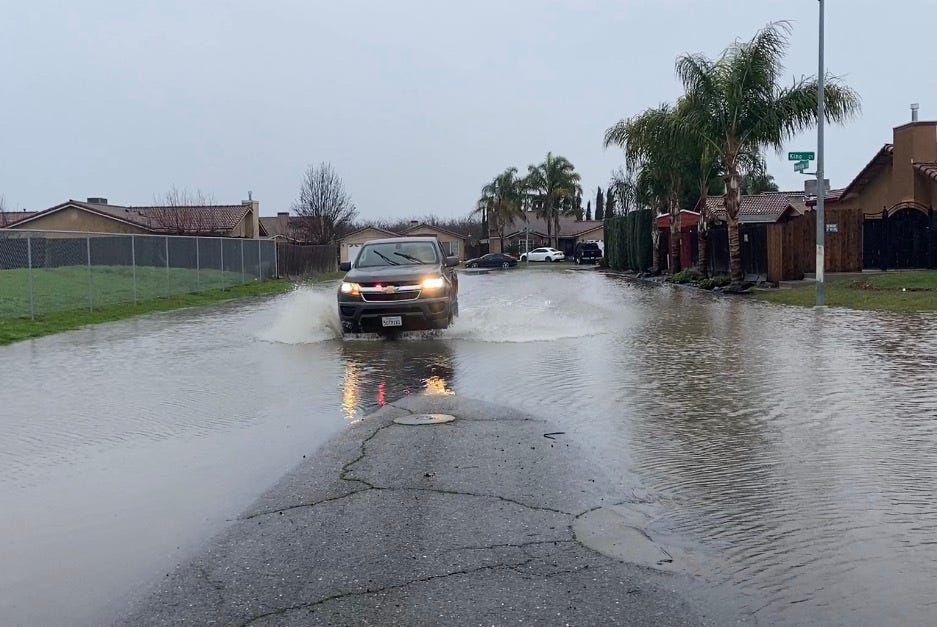‘It’s long overdue.’ After massive floods, Planada residents await plan for $20M in disaster relief
Following county workshops, residents worry the funding won't go toward homes that were damaged
Homes are shown after flooding in Planada, Calif. in January 2023. Photo by Esther Quintanilla/KVPR
By BRIANNA VACCARI
brianna@cvlocaljournalism.org
PLANADA (CVJC) – As Merced County prepares to distribute $20 million in state flood relief for Planada, residents who endured losses earlier this year are bracing for a fight ahead over who will get a share of the funding.
County officials are scheduled to present a draft spending plan to Planada residents Tuesday and the final plan on Dec. 5. Officials estimate after the application process opens, residents will begin receiving money in spring.
Since the floods, Merced County has spent $5 million in response and recovery efforts. The state spent another $13 million on debris removal.
But for Planada residents who lost their homes, possessions and – in some cases – months of work, to the flood 10 months ago, they worry the state money that’s on its way won’t meet all their needs.
They say they already had to endure a long wait.
“The long process is contributing to people’s frustrations,” said Saul Calderon, a resident who attended the workshops. “It’s been almost a year. It’s long overdue. The delay is going to result in band-aid solutions.”
Large share of households suffered loss
Amid a powerful storm in early January, a levee broke open on Miles Creek just outside of Planada, catching the farm worker community by surprise in the middle of the night.
Floodwaters inundated the town, submerging homes in feet of water and damaging the elementary school, the post office, the fire station and other community facilities.
Located amid fields and orchards east of Merced, nearly all of Planada’s 4,000 residents are primarily Spanish-speaking Latinos with roots in Mexico, according to U.S. Census figures.
According to researchers at UC Merced’s Community and Labor Center, about half of Planada’s properties are occupied by renters. One-third of the community’s labor force works in agriculture, Census estimates show.
Many residents whose homes were damaged in the flood already spent their life’s savings, took out loans or accrued credit card debt to repair their homes and replace their belongings.
That’s the case for Anastacio Rosales Jr., who lost all his possessions overnight to the flood while he was out of town. His home was substantially damaged in the flood, but by now, he’s completed most major repairs.
Those repairs came at a hefty cost. He took out tens of thousands in loans, on top of using his savings. In total, he estimates he’s spent $45,000. Additionally, he lost months of work harvesting sweet potatoes due to flooding.
“If everyone were to get an equal amount, $20 million isn’t enough,” he said. “The county is going to have to figure it out and check the receipts.”
Rosales attended Merced County Board of Supervisors meetings in October, imploring the county representatives to provide more information about the community workshops. Rosales is semi-retired and said that he attended the meetings and spoke to the supervisors because many working Planada residents couldn’t be there or only speak Spanish.
UC Merced’s research-based Community and Labor Center in May published an analysis of unmet community needs and policy gaps in disaster relief for the flooding in Planada. Researchers found that more than 80% of Planada households suffered losses due to the flooding.
Few residents could access disaster aid because federal relief is restricted to U.S. citizens, and unemployment benefits don’t go to those in informal or cash-pay jobs, according to the research.
Residents are holding out hope for more direct support, since the state budget allocation specifically states the aid will be available to all residents, regardless of immigration status.
A Merced County staffer, left, speaks with Planada residents on Oct. 8, 2023 at the Planada Community Center during a workshop the county hosted in preparation to distribute $20 million in state aid for flood relief. Credit: Brianna Vaccari/CVJC
Residents voice their needs
This month, hundreds of residents attended county workshops to provide feedback to county staff on what home repairs remain and what kind of evidence should be accepted to document their losses.
Mark Hendrickson, assistant CEO for Merced County, called the workshops “next-level engagement” for the county. Staff from various departments helped facilitate the workshops, which were primarily in Spanish. The county also is collaborating with community-based organizations to connect with residents, he said.
“We’re committed to getting resources to those who need them most,” he said.
But some residents, wary of offending their neighbors or appearing ungrateful, say they recognize everyone affected by the flood has a different level of need. For those reasons, some residents who spoke to CVJC declined to be named for this story.
They said they hope the aid is distributed fairly so residents with the greatest needs receive their fair share.
“Whoever is giving out the money needs to make sure people are being honest,” said one woman whose home was severely damaged by the flood. “It’s going to be tricky, and not everyone will be happy.”
Residents also worry Merced County will use large chunks of the funding on infrastructure or to assist small businesses, which is not in line with how residents want the money used.
“Honestly, I don’t really have faith in the process,” said Rufino Román at the last workshop on Thursday. “They’re indicating a majority of the funds will go to infrastructure. I think there's a general consensus among us folks who got really heavily impacted that the three main categories where we need support (are) home repairs, rental assistance and vehicle replacement.”
At the county workshops few, if any, questions were asked about rental assistance.
“This is supposed to be direct money for those who were impacted,” Calderon said. “The money isn’t for infrastructure. Any maintenance should’ve happened before the flood.”
“Infrastructure is why we pay taxes,” Román said.
The UC Merced study recommended $5 million of the state’s $20 million allocation be used for infrastructure. That study was the basis for the legislation in the state budget for the funding.
Attorneys representing hundreds of Planada and Merced County residents are preparing legal action against Merced County, Merced Irrigation District and other government agencies, alleging the flooding was preventable.
Residents at the county workshops echoed that sentiment. They say they hope the $20 million isn’t used to fix a mistake that wasn’t theirs.
As Joaquin Romero said: “It’s not our fault it happened.”
Brianna Vaccari is the governmental accountability/watchdog reporter for the Central Valley Journalism Collaborative, a nonprofit newsroom based in Merced.
Flooded streets are shown in Planada, California in January 2023. Photo by Esther Quintanilla/KVPR






